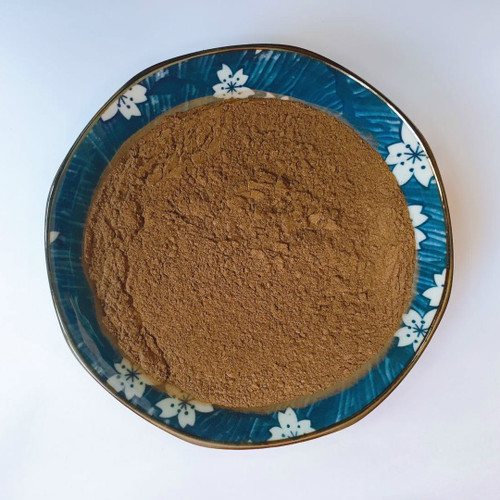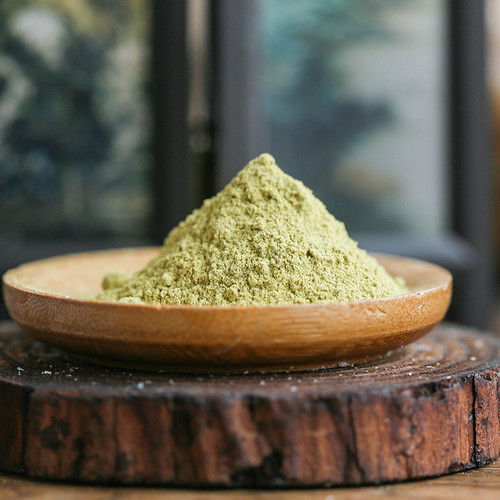Product Overview
Parts used: Prepared dried root tuber
TCM category: Tonic herbs for Blood Deficiency
TCM nature: Warm
TCM taste(s): Sweet
Meridian affinity: Kidney Liver
Scientific name: Rehmannia glutinosa
Use of prepared rehmannia (Shu Di huang) in TCM
Please note that you should never self-prescribe TCM ingredients. A TCM ingredient is almost never eaten on its own but as part of a formula containing several ingredients that act together. Please consult a professional TCM practitionner, they will be best able to guide you.
Preparation: The roots are steamed and dried in the sun 9 times before being dried for a final time.
Dosage: 9 - 30 grams
Main actions according to TCM*: Tonifies the Blood. Tonifies the Yin of the Kidneys.
Primary conditions or symptoms for which prepared rehmannia may be prescribed by TCM doctors*: Night sweats Anemia Palpitations Abnormal uterine bleeding Tinnitus Premature graying
Contraindications*: This herb should be used with caution by those with weak digestion and Spleen Qi. It should be avoided by those with Stagnation of Qi or Phlegm.
Common TCM formulas in which prepared rehmannia are used*:
For Yin and Blood Deficiency with constipation caused by a lack of fluids combine prepared rehmannia with dong quai (Dang Gui) and hemp seeds (Huo Ma Ren).
For Blood tonification combine prepared rehmannia with dong quai (Dang Gui), szechuan lovage roots (Chuan Xiong) and white peony roots (Bai Shao).
For spermatorrhea and night sweats combine prepared rehmannia with yam (Shan Yao) and cornelian cherries (Shan Zhu Yu).
For Lung and Kidney Yin Deficiency associated with chronic bronchitis, asthma or chronic pharyngitis combine prepared rehmannia with lily bulbs (Bai He), unprepared rehmannia (Di Huang), dwarf lilyturf roots (Mai Dong), white peony roots (Bai Shao), dong quai (Dang Gui), ningpo figwort roots (Xuan Shen), platycodon roots (Jie Geng), fritillary bulbs (Chuan Bei Mu) and liquorice (Gan Cao).
For conditions such as anemia, weakness, tiredness, irregular menses caused by exhaustion or postpartum recovery combine prepared rehmannia with ginseng (Ren Shen), atractylodes rhizomes (Bai Shu), poria-cocos mushrooms (Fu Ling), liquorice (Gan Cao), dong quai (Dang Gui), szechuan lovage roots (Chuan Xiong), white peony roots (Bai Shao), fresh ginger (Sheng Jiang) and jujube dates (Da Zao).
For nightsweats combine prepared rehmannia with ephedra root (Ma Huang Gen) and biota seeds (Bo Zi Ren).
For Liver and Kidney deficiency with diminished visual acuity combine prepared rehmannia with palmleaf raspberries (Fu Pen Zi), goji berries (Gou Qi Zi) and glossy privet fruits (Nu Zhen Zi).
Key TCM concepts behind prepared rehmannia (Shu Di huang)'s properties
In Traditional Chinese Medicine (TCM), prepared rehmannia are plants that belong to the 'Tonic herbs for Blood Deficiency' category. Tonic herbs are used for patterns of Deficiency, when one lacks one of the 'Four Treasures' (Qi, Blood, Yin and Yang). Blood tonics tend to be bitter-sweet with either a Warm or neutral nature. Because the Liver stores Blood, all Blood tonics enter that Organ meridian.
As suggested by its category prepared rehmannia are plants that are Warm in nature. This means that prepared rehmannia tend to help people who have too much "cold" in their body, although with less effect than a plant that would be Hot in nature. Balance between Yin and Yang is a key health concept in TCM. Those who have too much cold in their body are said to either have a Yin excess (because Yin is Cold in nature) or a Yang deficiency (Yang is Hot in Nature). Depending on your condition prepared rehmannia can help restore a harmonious balance between Yin and Yang.
Prepared rehmannia also taste Sweet. The so-called "five elements" theory in Chinese Medicine states that the taste of TCM ingredients is a key determinant of their action in the body. Sweet ingredients like prepared rehmannia tend to slow down acute reactions and detoxify the body. They also have a tonic effect because they replenish Qi and Blood.
The tastes of ingredients in TCM also determine what organs and meridians they target. As such prepared rehmannia are thought to target the Kidney and the Liver. According to TCM, the Kidneys do not only regulate the urinary system but also play a key role in the reproductive system and the growth and aging process of the body. The Liver on the other hand is often referred as the body's "general" because it is in charge of regulating the movements of Qi and body fluids. It also takes a leading role in balancing our emotions.










